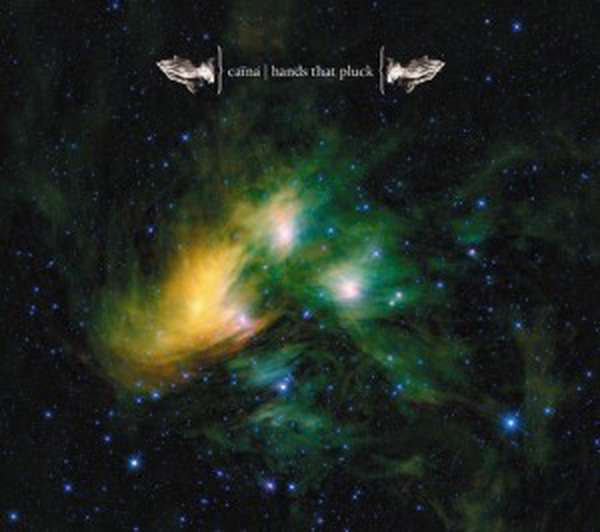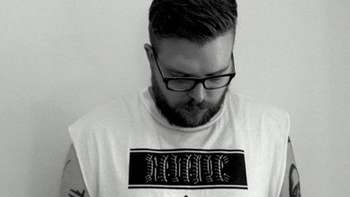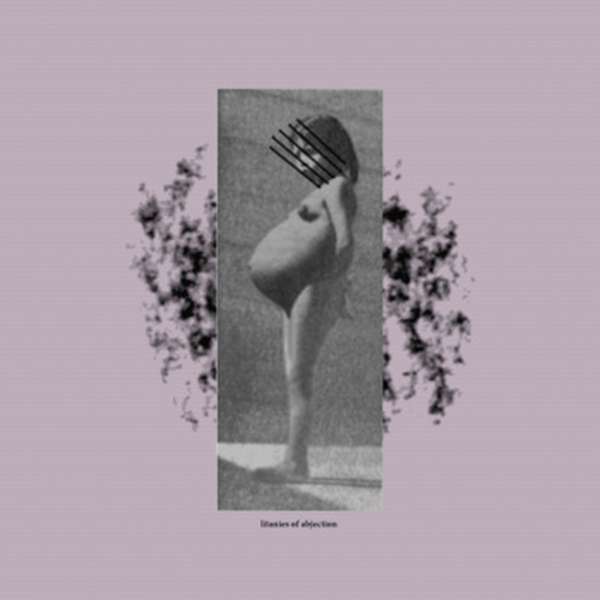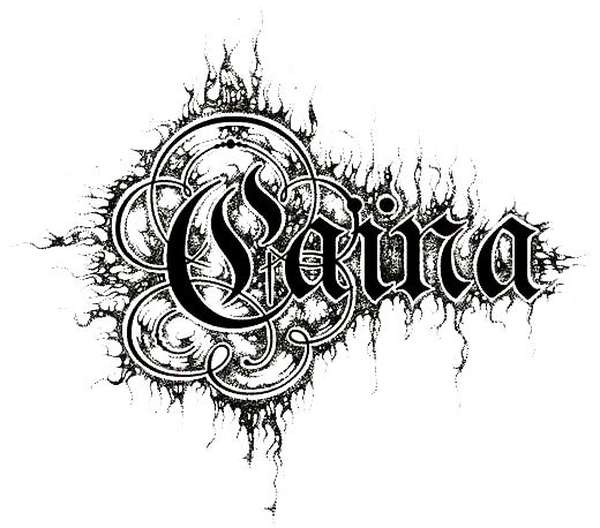Hands That Pluck is uncompromising. The final album under the Caïna name for (one man) band leader Andy Curtis-Brignell is intense. Vocally, musically, and lyrically. This is an album dealing with the subject of finality - even more so because it will be the last Caïna release - with ideas of religion and will making numerous appearances.
"Profane Inheritors" gives you no chance to settle in, and this first track promptly demolishes without warning. It's immediate, bringing to mind more recent Darkthrone output. Crusty, black metal with Caïna's trademark vocals. And then, it all changes. A slow rumbling drum beat drives it forward, Curtis-Brignell growling as if life itself depended on the expulsion of the words. Again, the style and speed completely takes a turn. The guitars absolutely stunning and somewhat at odds with the vocal delivery, occasionally taking a more post-black metal/rock edge. It's the mixing of styles that makes this album the monolith that it is. Being unafraid to bear influences is something that Caïna do, and damn, it's done well.
Next track "Murrain" features guest vocals from Imperial of Krieg. For the first time, Caïna have not only one guest artist, but three. And it's a tactic that's certainly paid off. Imperial brings his own style to the song. One of immense presence, his vocals fitting quite flawlessly with the band's sound. This piece has an incredible mid-section. The track slows down, the drums becoming an integral part of the instrumental aspects of the song. Again, fairly post-rock in style. And whilst you're being lulled into a deep sense of quiet, Imperial's vocals kick in, the guitar is fuzzy and fast, and you cannot stop yourself from banging your head furiously for the following two minutes.
"Hands That Pluck," the title track, is for all intents and purposes, an instrumental track. It begins with a quote from the film Cross of Iron, and the remainder of the song is minimal, barely there. Beautiful sequences of noise and electronic soundscapes. There's another use of a film quote later in the album, on "Haruspication", utilising Lars Von Trier's somewhat controversial Antichrist. We have an interview coming up with Andy, in which he'll touch upon these two samples and his reasons for using them.
"The Sea Of Grief Has No Shores" starts with a gorgeous shimmery guitar and a sublime bass (Jon Curtis-Brignell) line. The drums are kept to a minimum, the cymbal doing a lot of the work. It's an understated composition and it evokes a sense of sadness and loss. An almost militaristic drum beat comes into the middle section driving the piece towards the conclusion. The guitar is quiet and there's hints of more of a post black metal style creeping in here. Especially in the closing minute, it's all fuzzy distortion and crashing cymbals. Quite exquisite.
You need this moment of quiet, because "Callus and Cicatrix" is next. A personal favourite, and featuring guest vocals from Rennie Resmini of Starkweather. It starts fairly slow, a mass of feedback and fat drum lines. It segues into a more stripped back affair quickly, a country twang in the guitar sound. Rennie's vocals are a perfect fit and this track features some glorious switching between sublime clean singing and the most filth laden performance this side of Beherit. Crashing cymbals and a wall of noise round this song out, and it's possibly the catchiest (in a sense) song Caïna have put to disc. Five and a half minutes in, and the vocals are deep, at the forefront of the track. The tempo has slowed to showcase the lyrics, always one of the most intriguing points of a Caïna album. The final minutes of the song are terrifying. The vocal is absolutely from the very depths of the soul. Snarls that no man should ever be able to produce close this song, which suddenly becomes quiet and once again there's beauty in the gently plucked guitar.
"Somnium Ignis" has several extraordinary moments. The moments of quiet jarring with the moments of complete intensity in a harmony that should not exist. The vocal performance could very well be the best Curtis-Brignell has produced with this project. There's a spoken interlude, faultless in it's placement, distorted guitars underneath and talking of the subject of the mind of God. Then the guitar is back to it's black metal best. The riff on display here is jaw dropping. Literally. Wailing and introducing that vocal that is instantly recognisable as belonging to Andy Curtis-Brignell; howls of "I dream of fire" ringing out and slowly leading into a bass heavy interim. The final few minutes are a little less intense. Classic black metal drum lines and some absolutely gorgeous electronic feedback soundtrack the end and bring us skillfully to the sample mentioned previously. The quote from Antichrist.
"Haruspication" is again, apart from the speech used, an instrumental. The utilisation of electronic noises, along with the quote, create a sense of claustrophobia, of darkness. If you've seen it, then this piece is only adds to the feeling of despair found in the film. If you haven't, then it's recommended, and you'll see why this particular quote was employed. It ends with chattering birds, a dawn chorus, and "I Know Thee Of Old" begins.
The sounds of nature build for three minutes or so, along with shimmering guitar and a deep bass line. Steadily building up and involving more of the electronic feedback this album is manipulating to remarkable effect. This track features the final guest vocalist heard on Hands That Pluck, those of C.Ross of Blood Revolt, Revenge and Axis Of Advance. Our interview will go a little more into the reasons these particular artists were chosen for the songs that they feature on, and their involvement in the writing process. Abruptly, the whole style becomes different. The drum is insanely fast, having more in common with black metal than most other tracks on this album. Because although this is black metal, there's so much more to it than what a basic genre definition can tell you. The vocal delivered by Ross is deep, guttural and at times it sounds genuinely pained. Six and half minutes in is a definite highlight. The drum rolls, the line "....these are the hands that pluck" emoting much in conjunction with the preceding intro of "Haruspication." They are to be taken as one whole piece. The track ends on an almost post-punk-like drum outro. Once more, differing styles coming together to fully round out the song.
"Ninety-Three" is the final track. Beginning slowly, agonised growls combining with a prominent bass line and a guitar slightly progressive in nature in it's flourishes. The drums kick in, quick and ushering in a sublime middle section. Absolute despair is heard in the lyrics, which talk again of ..."hands that pluck." Words used often in this body of work, linking each track with a common thread. This album is one to be appreciated as a whole. The tracks put together in such a way as to tell a story. Around the five minute mark, the track seems to slow, the vocal suddenly becomes huge, the word "...desire" projected into the abyss. It's glorious. The guitar speeds up, the drum militaristic, rolling into a massive electric guitar riff. Just as quickly, it changes again. The bass filling the air and the guitar shrieking as if there was no tomorrow. And then it ends, without warning it's over. It's a breathless finale. The entire last section leaves you feeling as though you're trying your hardest to get to the end, to finish the story and for it to be complete. Andy Curtis-Brignell is bidding goodbye to Caïna with this album, and the closing moments of this song are fitting tribute.
This album is a little over seventy minutes long, it's complex and has so much to offer that you'll be pressing repeat immediately after your first listen. This is not an album to be consumed in one sitting. It's an album to take your time with. Each listen will bring something new; even after multiple plays, I still don't think I've really taken it all in. Hands That Pluck will stay with you long after the closing seconds. In your dreams, and in your reality.









